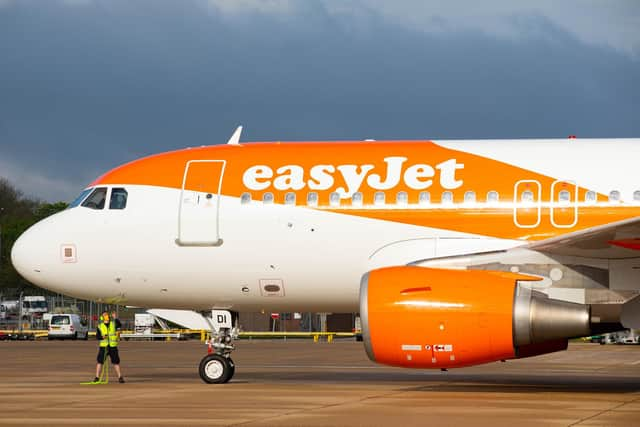EasyJet reveals first-half losses are expected to narrow by more than £50m
In an update on its half-year performance, the group said it is on track for headline pre-tax losses of £340m to £360m in the six months to March 31, against losses of £411mi a year earlier.
The airline said demand has bounced back since late November, with half-year figures also boosted by the start of the Easter holidays falling in March this year.
Advertisement
Hide AdAdvertisement
Hide AdIt comes in spite of a “direct impact” of around £40m in the six months to the end of March due to the war between Israel and Hamas.


This relates to the suspension of flights to Israel and Jordan, alongside a softening of demand for trips to Egypt since the conflict began in October.
EasyJet said earlier this week that it is suspending flights to Tel Aviv for the next six months after Iran’s missile and drone attack against Israel at the weekend.
Between October and March, passengers numbers were up 8 per cent year on year, while average fares paid increased by 9 per cent.
Advertisement
Hide AdAdvertisement
Hide AdSeasonal demand for air travel means airlines often record losses in the winter and profits in the summer.
Bookings for this summer “continue to build well”, easyJet said, with “an increase in volume and pricing compared to the same period last year”.
EasyJet chief executive Johan Lundgren said: “The importance that consumers place on travel coupled with easyJet’s trusted brand has driven good demand for our flights and holidays.
“Our growth and focus on productivity have reduced winter losses by more than £50m.
Advertisement
Hide AdAdvertisement
Hide Ad“We have further enhanced our network with the launch of new bases in Alicante and Birmingham providing greater choice for consumers across Europe.
“We are well set up operationally for this summer season where we expect easyJet to be one of the fastest growing major airlines in Europe and take more customers on easyJet holidays than ever before.”
Richard Hunter, Head of Markets at interactive investor, commented: “easyJet has made measurable progress in reducing its seasonal and traditional winter losses and is now well set for a busy and profitable summer period.
He added: “Aside from the conflict in the Middle East, there remains the possibility that the consumer will again batten down the hatches on discretionary spend.
Advertisement
Hide AdAdvertisement
Hide Ad"That being said, there seems to be an increasing body of evidence to suggest that the family holiday remains almost sacrosanct and outside of normal budgetary restraints.
“The share price has reflected the volatile swings which inevitably track the sector. Over a five-year period, the shares are down by 49 per cent, during which time easyJet saw both relegation from and promotion to the FTSE100 in 2019.
“The group was relegated again in June 2020 as the pandemic struck its blow, finally regaining its status in the premier index last month.
"The initial reaction to the update is positive based on both immediate and medium-term prospects, which will in turn do little to trouble the current market consensus of the shares as a buy.”
Comment Guidelines
National World encourages reader discussion on our stories. User feedback, insights and back-and-forth exchanges add a rich layer of context to reporting. Please review our Community Guidelines before commenting.